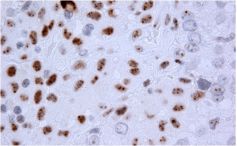
2012/08/20
Burning fat for cellular fitness: friend or foe?
Fat accumulation and elimination in developed societies is an increasing health and aesthetic concern. But there is more to this process than just the impact of lipid accumulation on the organism. Lipids are one of the most concentrated sources of energy and therefore they are an invaluable nutrient for our cells in challenging conditions. However, little is known about the impact of fat burning processes in cellular fitness. Two independent studies led by Arkaitz Carracedo, Ikerbasque Research Professor at CIC bioGUNE, part of an excellent team directed by Pier Paolo Pandolfi at Harvard Medical School, have unraveled how known and novel components of lipid burning regulation impact on cellular and body fitness. In these studies, a well-described tumor suppressor - the promyelocytic leukemia protein (PML) - which ensures that the cell behaves correctly and keeps tumor cells in check, is found to be a new regulator of the fat burning process (defined as fatty acid oxidation or FAO, for short). The metabolic activity of PML uncovers novel and paradoxical functions for this protein.
The first study, published in The Journal of Clinical Investigation, defines the mechanism by which PML regulates FAO (involving the regulation of peroxisome proliferator-activated receptors - PPARs) and shows that alterations in this pathway result in excessive fat accumulation and the development of obesity in mouse models. Surprisingly, by regulating metabolism, PML exerts a paradoxical activity in breast cancer, where instead of keeping breast cancer cells under control, it provides a selective advantage in conditions of metabolic challenge. This observation is correlated with the increase in PML levels in a subset of breast cancer specimens and its association with poor prognosis. Therefore, this study provides puzzling evidence of an unexpected activity of PML in breast cancer, where, instead of keeping cancer cells under control, it provides them with energy to survive.
The second study, carried out jointly with Dr. Keisuke Ito (now at Albert Einstein College of Medicine), has defined for the first time the contribution of lipid metabolism to the maintenance and function of hematopoietic stem cells, the source of the hematopoietic lineage. This work, published in Nature Medicine, describes how hematopoietic stem cells require high levels of FAO in order to maintain their undifferentiated state. Indeed, the pharmacological or genetic inhibition of this metabolic pathway (which is regulated by PML and PPAR delta), results in the inability of hematopoietic stem cells to sustain blood cell supply, while its activation enhances the capability of these cells to replenish the hematopoietic compartment in bone marrow transplants.
What do we learn from these studies? First of all, fat burning is of tremendous relevance to normal and cancer cells. These two studies cover the impact of the process in different aspects of biomedical research: obesity, breast cancer and hematopoietic stem cell maintenance. But, importantly, the pathway described is highly amenable to pharmacological manipulation. PML, PPARs and FAO can be modulated using compounds that are either in the clinic or that have already passed through toxicity and tolerability evaluations in clinical trials. Hence, understanding the relevance of this novel pathway in obesity, hematopoietic stem cell maintenance and breast cancer, could potentially lead, with further investigation, to the evaluation of pharmacological approaches to improve the treatment of these pathologies in the future.
Link: Nature medicine
Link: Journal of Clinical Investigation
See a large version of the first picture





